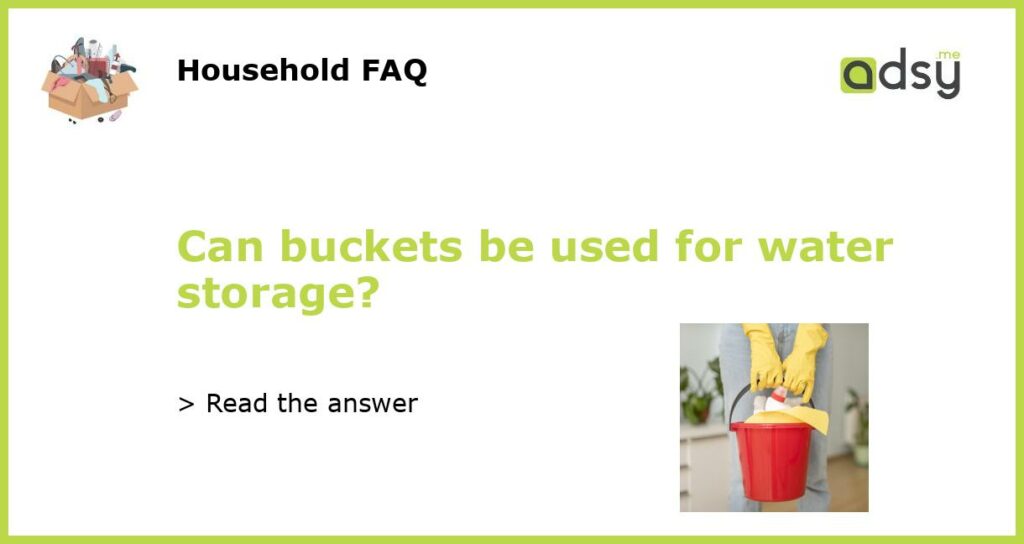Yes, buckets can be used for water storage
Buckets are versatile containers that can be used for a variety of purposes, including water storage. Whether you need a temporary solution for emergency situations or a more long-term option for storing and accessing water, buckets can be a practical and affordable choice.
Why use buckets for water storage?
There are several reasons why buckets can be a good option for water storage:
- Affordability: Buckets are relatively inexpensive compared to other water storage options, such as tanks or barrels. You can find buckets at your local hardware or home improvement store for a reasonable price.
- Portability: Buckets are lightweight and easy to transport, making them ideal for camping trips, outdoor events, or emergency situations. You can easily fill them up with water and move them to wherever you need them.
- Durability: Many buckets are made from strong and durable materials, such as heavy-duty plastic or metal. This means they can withstand rough handling, extreme temperatures, and exposure to the elements without breaking or leaking.
- Accessibility: Buckets typically have wide openings that make it easy to fill them up with water. They also often have sturdy handles that allow for easy carrying and pouring.
- Versatility: In addition to water storage, buckets can be used for a variety of other purposes, such as gardening, household chores, or DIY projects. This means you can make the most of your investment and put your buckets to use even when you don’t need them for water storage.
Tips for using buckets for water storage
If you decide to use buckets for water storage, here are a few tips to keep in mind:
- Choose the right bucket: Look for buckets that are food-grade and specifically designed for water storage. These buckets are made from materials that are safe for storing drinking water and will not contaminate the water.
- Clean and disinfect the buckets: Before using the buckets for water storage, make sure to clean and disinfect them to remove any dust, dirt, or bacteria. You can wash them with warm soapy water and then use a mixture of bleach and water to disinfect them.
- Seal the buckets tightly: To prevent water from leaking or spilling, make sure to seal the buckets tightly. You can use airtight lids or gaskets to create a secure seal. It’s also a good idea to store the buckets in a cool, dark place to minimize the risk of bacterial growth or algae formation.
- Rotate the water: If you’re using buckets for long-term water storage, it’s important to rotate the water regularly. This ensures that the water stays fresh and reduces the risk of contamination. Consider using the stored water for non-drinking purposes, such as cleaning or gardening, and replace it with fresh water periodically.
- Consider additional filtration or treatment: Depending on the quality of the water you’re storing, you may want to consider additional filtration or treatment methods to make it safe for drinking. This can include using water purification tablets, filters, or UV sterilization devices.
Alternative water storage options
While buckets can be a practical choice for water storage, they may not be the best option for every situation. Here are a few alternative water storage options to consider:
- Water storage tanks: If you need to store a large amount of water for an extended period, water storage tanks are a more suitable choice. These tanks come in various sizes and can be installed above or below ground. They are designed to withstand heavy loads and have built-in features for easy filling, draining, and accessing the water.
- Rainwater harvesting systems: If you want to utilize rainwater for your water storage needs, consider installing a rainwater harvesting system. These systems collect rainwater from your roof and store it in dedicated tanks or cisterns. They often include filters and pumps to ensure the water is clean and accessible.
- Barrels or drums: Similar to buckets, barrels or drums can be used for water storage. They come in different sizes and materials, and can be suitable for both short-term and long-term storage. Barrels often have larger capacities than buckets, making them a better option for storing larger quantities of water.
- Water coolers or jugs: For smaller-scale water storage needs, consider using water coolers or jugs. These containers are designed for dispensing drinking water and can be easily refilled and transported.
In conclusion, buckets can indeed be used for water storage. They offer affordability, portability, and versatility, making them a practical choice for a range of situations. However, it’s important to choose the right bucket, clean and seal it properly, and consider additional treatment methods if necessary. If buckets don’t meet your specific water storage requirements, there are alternative options available, such as water storage tanks, rainwater harvesting systems, barrels or drums, and water coolers or jugs.






